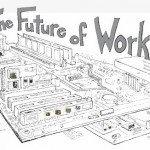 Last week Quora hosted one of their annual SmartWorking Summits, whereby they engage leaders in some of the trends affecting how we work in the modern era. The event featured 8 speakers, covering topics ranging from technology to human resources.
Last week Quora hosted one of their annual SmartWorking Summits, whereby they engage leaders in some of the trends affecting how we work in the modern era. The event featured 8 speakers, covering topics ranging from technology to human resources.
If you’re a regular reader of this blog then I suspect the kind of things discussed at the event won’t have come as a great revolution to you, with topics such as flexible working, social collaboration tools, managing different generations and so on all touched upon. Nevertheless, there were a few stand-out points from the event (for me at least).
First up was Paul Preston, a management consultant at Eyes Wide Open and former HR chief at Unilever. He delivered a very charismatic presentation on the need for focus. He made the point that there were various seemingly fluffy initiatives in place in our organizations that, whilst potentially nice, weren’t really implemented with any real business need in mind. Things such as wellness or vitality programmes for instance.
To make his point he used an analogy of an Airbus aeroplane. The chances of that plane experiencing problems during an average flight are thankfully miniscule, but that is only the case because all of the staff employed in its construction and operation have a laser focus on ensuring just that. He suggested that there is not the same kind of rigour employed in ensuring our people are functioning to the best of their ability, and until we get that kind of focus, people will continue to underperform.
Next onto the stage was Nicola Millard, a veritable bundle of energy who works as a futurologist at BT. A central chunk of her work is involved in predicting and planning for the future of work. As such, she identified five key trends that will shape the workplace:
- An increase in diversity as we see an increasing number of generations in the workplace at once
- The gradual demise of a rigid 9-5 work life
- The allocation of employees to cubicles, or even to their own desk, will wither in the face of more flexible work patterns
- Distance will no longer be a factor in our work relationships
- There will be a continued merging of work and social life
Suffice to say, many of these trends will be familiar to you I’m sure, but nevertheless it was nice to hear conformation of the general direction of future workplace. Where I think the event lacked somewhat, and where I try to redress the balance in my 8 Step Guide to a Social Workplace, is in how organizations can begin to make the shift.
We heard a few dubious stories, such as forcibly clearing desks at the end of each day at Vodafone, to a presentation seeming to fly in the face of evidence about intrinsic motivation by Jane Harley, but little in the way of systemic anecdotes to tie everything together. Maybe that’s something for the next event.
Sounds like it was an interesting event. I do get the impression that it's a lot easier to talk about these things than do them though.
That is the enduring challenge Nick. Implementation and change is generally the hard part.